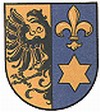
het Bildt is a former municipality in the province of Friesland in the northern Netherlands; its capital was Sint Annaparochie. The population was data missing in 2021. On 1 January 2018 it merged with the municipalities of Franekeradeel, Menameradiel and parts of Littenseradiel to form the new municipality Waadhoeke.

Floris V reigned as Count of Holland and Zeeland from 1256 until 1296. His life was documented in detail in the Rijmkroniek by Melis Stoke, his chronicler. He is credited with a mostly peaceful reign, modernizing administration, policies beneficial to trade, generally acting in the interests of his peasants at the expense of nobility, and reclaiming land from the sea. His dramatic murder, engineered by King Edward I of England and Guy, Count of Flanders, made him a hero in Holland.

Podestà was the name given to the holder of the highest civil office in the government of the cities of Central and Northern Italy during the Late Middle Ages. Sometimes, it meant the chief magistrate of a city state, the counterpart to similar positions in other cities that went by other names, e.g. rettori ("rectors").
Dirk VII was the count of Holland from 1190 to 1203. He was the elder son of Floris III and Ada of Huntingdon.

Conrad was bishop of Utrecht between 1076 and 1099.

Johannes, Count van den Bosch was a Dutch officer and politician. He was Governor-General of the Dutch East Indies (1830–1833), commander of the Royal Netherlands East Indies Army, Minister of Colonies, and Minister of State. He was an officer in the Military William Order.

West Frisia is a term that, when used in an international context, refers to the traditionally Frisian areas that are located west of the Dollart. Along with East Frisia and North Frisia, it is one of the most commonly used subdivisions of Frisia. In its narrowest sense, the term is synonymous with the province of Friesland. Within the Netherlands, however, it is mostly used to refer to the region of West Friesland, located west of Friesland.
Waleran II, also called Paganus, probably due to a late baptism, was the Duke of Limburg and Count of Arlon from his father's death in about 1119 until his own twenty years later. He was given the Duchy of Lower Lorraine by Lothair III, Holy Roman Emperor in 1128 after the latter's accession as King of Germany in 1125.
The Friso-Hollandic Wars, also called Frisian-Hollandic Wars, were a series of short medieval wars consisting of the attempts made by the counts of Holland to conquer the free Frisian territories, which lay to the north and east of their domain. These wars were waged off and on from 1256 to 1297, 1324 to 1348, 1396 to 1411, and from 1421 to 1422, although it could be argued that a state of war continued to exist between the County of Holland and the Frisian territories till well after the year 1500.

Ygo Gales Galama was a 15th-century Frisian warlord and Galama-patriarch.
Haring Harinxma (1323–1404) was a powerful Frisian chieftain and Schieringer who lived during the 13th and early 14th centuries. Haring also used the surname Donia, and is considered the patriarch of this well known Frisian family. Another title used by Haring was thoe Heeg meaning 'of Heeg', where he was born and lived.
Sjoerd Pijbes Wiarda was the fifteenth potestaat of Friesland now a province of the Netherlands.

Liudolf of Brunswick was Margrave of Frisia, Count of Brunswick, Count in the Derlingau and the Gudingau.

Frisian freedom was the absence of feudalism and serfdom in Frisia, the area that was originally inhabited by the Frisians. Historical Frisia included the modern provinces of Friesland and Groningen, and the area of West Friesland, in the Netherlands, and East Friesland in Germany. During the period of Frisian freedom the area did not have a sovereign lord who owned and administered the land. The freedom of the Frisians developed in the context of ongoing disputes over the rights of local nobility.
Jan Willems, also known as Janke or Yankey Willems, was a 17th-century Dutch buccaneer. Based out of Petit-Goâve, Willems participated in a number of expeditions against the Spanish during the early to mid-1680s with other well-known privateers including Michiel Andrieszoon, Thomas Paine, Laurens de Graaf, Nicholas van Hoorn and Michel de Grammont.
Andries or Andreas van Cuijk was a bishop of Utrecht from 1128 to 1139.
Otto II, Count of Zutphen was a Dutch nobleman from the early 12th century. Otto was the son of Gottschalk, Count of Zutphen and Adelheid of Zutphen, daughter of Liudolf of Lotharingia, Liudolf himself was grandson of Emperor Otto II and Theophanu. In 1107 he received the Frisian domains of Westergo, Oostergo and Suthergo of Henry V, Holy Roman Emperor in exchange for landed possessions around Alzey.

Floris I van Haamstede was Lord of Haamstede Castle on Schouwen, and of several other areas in Zeeland, Netherlands.
Potestaat was the title of a governor of medieval Friesland. According to the legendary 8th-century Karelsprivilege, which is probably a later forgery, Charlemagne had first granted the title of potestaat to Magnus Forteman. He and most of his early successors were probably entirely fictional, invented later by pseudohistorians in order to argue in favour of the notion of Frisian freedom. The title potestaat does not appear in historical documents until 1470, and at most, the earliest potestaatavant la lettre can be dated to the 13th century.








